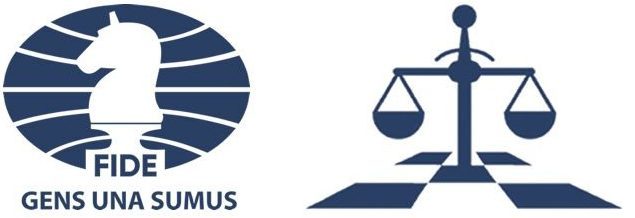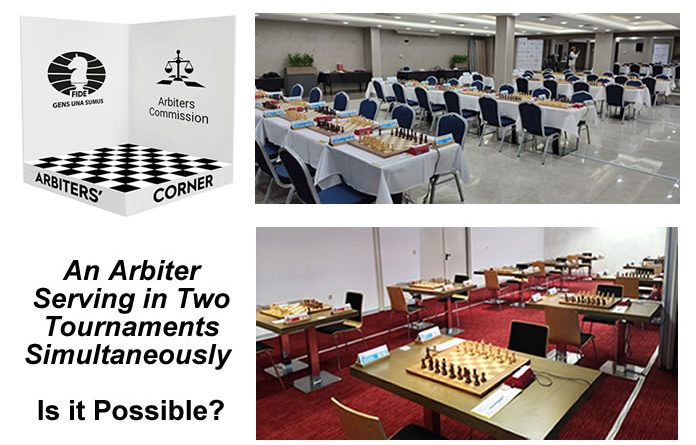An Arbiter Serving in Two Tournaments Simultaneously – Is it Possible?
IA Anantharam Rathinam
There might have been several instances in the past, wherein an arbiter of a tournament also participating in the same tournament as a player. Now FIDE has put a full stop to it by bringing the rule in the Title regulations
1.1.6 No appointed arbiter may play in a title tournament even just as a filler.
Needless to say that it is better applied to all kinds of tournaments.
An arbiter in a chess tournament plays a vital role in its smooth conduct. According to Article 12 of the FIDE Laws of Chess, an arbiter has to
- To see that the Laws of Chess are observed.
- To ensure fair play and must follow the Anti-cheating regulations. This means that we also must take care to prevent any cheating by the players.
- To act in the best interest of the competition. To ensure that a good playing environment is maintained and that the players are not disturbed. To supervise the progress of the competition
- To observe the games, especially when the players are short of time, and enforce decisions made and impose penalties on players where appropriate.
Recently, some questions have been arising whether to allow an arbiter to serve in two tournaments simultaneously. According to the chapter 1 of the Arbiters’ Manual regarding the role of the arbiters and their duties:
It is not acceptable for the Arbiters to leave the playing area every 10 or 15 minutes to smoke or vape, nor for any conversations with friends, spectators, officials, or other persons, nor to leave their sector unattended in order to go and watch other games in another part of the playing hall.
The article further says:
Certainly, the biggest problems during games are caused because of the absence or the lack of attention of the Arbiters and thus the ignorance of what actually happened in the case of an incident. How is an absent Arbiter able to make a fair decision in a dispute between two players caused because of a touched piece (e.g. the opponents do not agree that the player said “j’adoube” in advance)? Without knowing what actually happened, the Arbiter has a 50% probability of making a correct decision and 50% of making the wrong one, losing in this way his credibility and the trust of the players.
By going through the above two statements by the FIDE Arbiters’ Commission, the arbiter is not supposed to go even to another part of the playing hall to watch the games. It also says the lack of attention of the arbiters causes very big problems and they cannot give a correct decision for a dispute taking place in their absence.
To quote the Arbiter Manual again:
a) Regularly check the electronic clocks by using the time control sheets (every thirty minutes, or as directed by the Chief Arbiter), the score sheets and the number of moves written.
c) Observe all the games, especially when there is time trouble, with the help of an assistant, if needed.
When an arbiter serves in two tournaments simultaneously (even if both take place in the same venue), how can he satisfy or implement all the above requirements in both tournaments? An arbiter has to be focussed on his duties during a tournament. If he serves in two tournaments, it is not possible for him to concentrate even on one tournament efficiently. When he is attending a problem in one tournament, if another player from the other tournament calls him, the position of the arbiter will be precarious. That too, if the tournaments are taking place in two nearby buildings instead of a single venue, his stance will be hopeless and helpless.
One may ask a question whether the chief arbiter of a tournament may serve as chief arbiter for another tournament. If it is a chess festival taking place in a single venue simultaneously, it may be possible for him to manage both with a little difficulty. He must be 100% dedicated to both tournaments and will be of much strain. There may be one or two deputy chief arbiters looking after the job in the absence of the chief arbiter. As far as there is no problem in both tournaments, it will be a cake walk for the chief arbiter. But, once both have serious problems in both at the same time, and require the attention of the chief arbiter, he will be put into soup and will be in a big trouble. Such a kind of scenario cannot be ruled out.
If the two tournaments where the arbiter works have totally different timings, say one having morning rounds and another having evening rounds, the arbiter may work in both provided the hectic activity does not take the steam out of him, because it will be sapping his energy completely. Besides, one has to be careful that the preparatory work of one tournament does not clash with the regular stream of the other. In Delhi Open, the richest prize money tournament in India, the norm tournament was held in the morning (except two rounds on two days) whereas the two rating restricted tournaments were held both morning and evening. It may not be possible for the arbiter to work in both tournaments. But, in the Mumbai Open, the GM tournament was held in the afternoon and the under 13 event was in the morning. Current India no. 2 D Gukesh won the GM event in 2018 and tied for the sixth place in the junior tournament. An arbiter has chances to work in both events in this kind of combo events.
Same situation can be applied to other arbiter related posts like pairing officer, fair play officer etc.
- Overseeing the tournament: They manages and coordinates the tournament, ensuring it runs smoothly and efficiently.
- Managing disputes: Whenever a dispute occurs, the sector arbiter looks into it. If they can’t resolve it, they could call the chief or the deputy chief to give their verdict.
- Final decision: In case of a dispute, players must abide by whatever decision the chief arbiter shall give.
- Maintaining records: A chief arbiter is responsible for maintaining all the records of the tournament, including the results of each round, the players’ ratings, and any other relevant information. After the tournament finish, a chief has to forward these records to FIDE.
- Communicating with players: They may also be required to communicate with players, organizers, and other officials during the tournament.
Doing all this on their own could be challenging. So to assist them in this duty, they have …
2. The Deputy Chief Arbiter
The deputy chief is usually responsible for executing the tasks set by the chief. For this, they may work closely with other arbiters at the event …
3. A Pairing Officer
As the name suggests, a pairing officer takes care of matching the players for each round. They also have to ensure that the pairings are fair and follow the standards set by FIDE.
Some of their duties include:
- Generating pairings: Most tournaments use a chess pairing software like ChessManager. So they should have the technical know-how to work with such software.
- Checking the right results go into the pairing software: A pairing officer must ensure that the results entered into the software are correct because a wrong result could mean that the entire pairing has to be changed.
- Put out the pairings for the players to see: They could do this via either of the following means:
– Uploading the pairing online.
– Sending an SMS to all the participants.
– Printing paper copies of the pairings and putting them on a display bulletin.
4. Sector Arbiter
A sectoral arbiter is responsible for enforcing the rules and regulations of a chess tournament within a specific section of the tournament.
Think of it like this – they’re the chief arbiter of their sector.
So let’s say there’s a 300-player tournament. So in total, there are 150 boards.
These will be divided into 3 sectors of 50 each, like:
Sector 1 (1-50 boards)
Sector 2 (50-100 boards)
Sector Zone 3 (100-150 boards)
Each of these is managed by a sectoral arbiter.
Their responsibilities are similar to that of a chief but limited to only their section of the tournament.
5. Assistant Arbiter
A sectoral arbiter might need a helping hand to manage their sector. Who could help?
It’s the assistant arbiter.
At the European Rapid and Blitz Championship 2022, there were roughly 2 arbiters (1 sectoral + 1 assistant) for every 30 tables.
Their responsibilities include:
- Resolving disputes: Whenever a dispute occurs between the players, they’re the first to hear the matter.
Both players present their version of the story, and they have to make a call based on that. - Noting down the correct results: After finishing the game, the players submit their results to the respective sectoral arbiter or their assistant.
- Sending the results to the pairing officer: After collecting the results of their sector, they should forward the same to the pairing officer.
6. Anti-cheating Arbiter
Big tournaments come with big prize funds. Someone could use unfair means to win a prize. How do you prevent it?
This is where anti-cheating arbiters come in.
They ensure that all players compete fairly and in the spirit of the game. Some of their responsibilities include:
- Monitoring players: They may observe specific players during their games and look for any suspicious behaviour that could indicate cheating.
- Fair-play measures: For this, they may need to enforce rules that are designed to prevent cheating, such as preventing the use of electronic devices or communication of information between players during rounds.
- Investigating cheating allegations: If there are allegations of cheating during a tournament, the anti-cheating arbiter will be called upon to investigate and take action.
Cheaters often use an engine to play the best moves. So having a good knowledge of the game and working with chess engines can be an essential skill for an anti-cheating arbiter!
Conclusion
No tournament can run smoothly without a team of arbiters. This team makes it all happen, from creating pairings to managing disputes to sending the final reports to FIDE. And we hope after reading this article, you see how the arbiters operate in a chess tournament with many players.
IA Anantharam Rathinam

